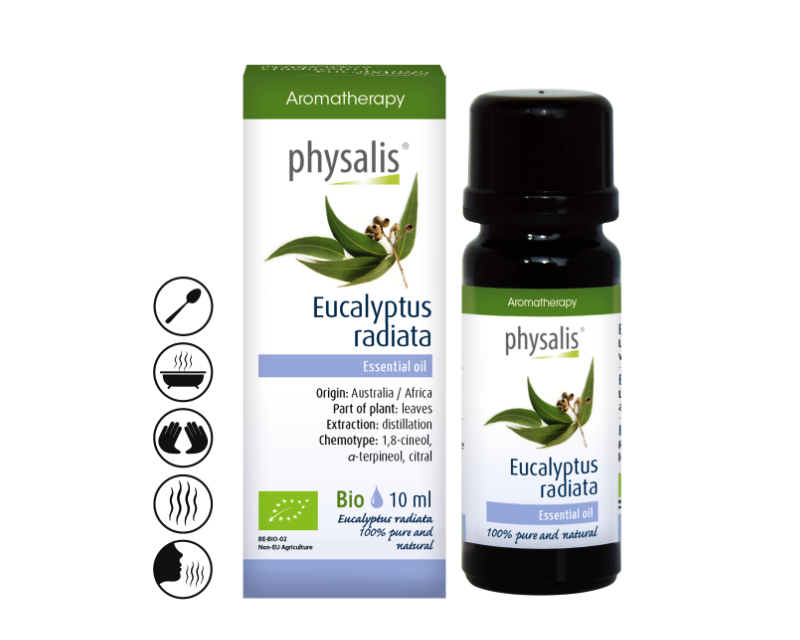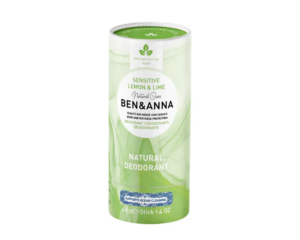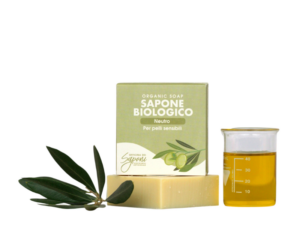Organic Eucalyptus essential oil, 10 ml
8.00€
The organic properties of Eucalyptus radiata are milder, making it more suitable for children (over 3 years). A chest ointment made from Eucalyptus radiata has a calming effect and helps breathing.
Essential oils are the aromatic and volatile components of plants, flowers and fruits. Physalis essential oils are botanically and biochemically defined. They are not chemically treated, modified, diluted, refined or rediscovered.
Plant part: leaves
Extraction: distillation
Chemical type: 1,8-cineole, α-terpinol, citral Oral: 1-2 drops 2 times a day. Recommended to use diluted with a little honey (infusion) or vegetable oil.
Skin: massage, bath: 5-10 drops in 10 ml of vegetable oil.
Contains naturally d-limonene, geraniol, citral, linalool, citronellol.
Diffuser: 5-10 drops according to your personal choice and the size of your room. Information leaflet and instructions for use:
Essential oils (essential or aromatic oils) are the fragrant, volatile constituents of herbs, flowers, fruits, seeds etc.
In aromatherapy, pure essential oils have a positive effect on our bodies when they are inhaled, ingested or applied to the skin. Essential oils can have a profound effect on our mood and health: they can help us relax, stimulate, calm our respiratory tract and more.
Enjoy essential oils safely and take the following precautions:
Essential oils are highly concentrated! Sometimes hundreds of kilos of fresh plants are needed to produce one kilo of oil. They must be used carefully and correctly (we advise you to consult a phytotherapy specialist). Incorrect use can be dangerous!
1. Keep them out of the reach of children!
2. Never exceed the recommended doses!
3. Some oils are only suitable for external use! Read the packaging!
4. Not recommended for babies and children under three years of age!
5. Not recommended for use during pregnancy and lactation!
6. Use essential oils with caution in cases of epilepsy, asthma and heart disease.
7. If you accidentally ingest a large amount of essential oil, take a tablespoon of vegetable oil and contact a Poison Control Centre.
8. When taking essential oils orally, mix them with vegetable oil, do not take them alone.
9. Never apply or drip undiluted essential oils directly on the skin. Dilute with a little vegetable oil or a neutral cream, gel or shampoo; they can also be used in the bath.
10. Several ingredients naturally occurring in essential oils may cause allergic reactions in hypersensitive people (e.g. citral, d-limonene, linalool, geraniol, citronellol, etc.). Read the warnings on the packaging! Tip: For sensitive, allergic skin, first add a drop of oil to a vegetable oil (such as sweet almond or coconut oil) and apply it to the inner part of the elbow. Wait 24 hours. If there are no signs of redness, itching or irritation, the oil can be used.
11. All citrus oils (made from bergamot, orange, lemon, grapefruit or tangerine peel) are photosensitive! Avoid sun exposure and do not use a tanning bed for at least 12 hours after applying citrus oil to your skin!
12. Avoid contact with eyes, nasal mucous membranes! When this happens, rinse thoroughly with clean water. If irritation or a wound is visible, a doctor must be contacted.
13. Do not use as ear or eye drops.
14. Thyme, savoury, oregano, clove, wintergreen and cinnamon essential oils are irritating. Do not ingest, boil or use these oils undiluted on the skin!
15. Continuous use or consumption of essential oils is not recommended.
16. Essential oils are flammable and volatile. Do not store them at high temperatures!
17. Store essential oils in a cool, dark place in a tightly sealed bottle!
18. Poison Information Office: +37052362052 or https://www.apsinuodijau.lt. Physalis® essential oils: quality guarantees
– 100% pure, natural and organic.
Not chemically treated, not modified, not mixed with other essential oils, not diluted, not rectified (= adjusted to a standard composition using chemicals or by re-distillation of the essential oil for certain concentrated components), not reconstituted. non-terpeneated.
– Verification of the identity and quality of each batch by means of gas chromatographic analysis (composition of the oil and identification of the different components), physical examination (density, refractive index, optical rotation) and organoleptic examination (smell, taste).
– The packaging of the product indicates the exact botanical species (Latin name), the origin, the parts of the plant used (leaves, flowers, twigs, seeds, roots, etc.), the method of extraction (slow and complete steam distillation under low pressure or cold pressing), the chemotype (biochemical specificity, specific components of each essential oil).
Oral use
Although this use of essential oils can be very effective, we advise you not to experiment! We advise you to do this only under the supervision of a therapist. It is essential to have a very good knowledge of different oils, as some essential oils can be very dangerous if used incorrectly! We strongly recommend that essential oils are not used by children (-6 years) and pregnant women. Never take more than 2 drops at a time and never use more than twice a day.
Massage, bath, shower
Essential oils are ideal for use in a massage, a soothing bath or a refreshing shower. They easily penetrate the skin, giving a positive effect. First, dilute the oil with a small amount of vegetable oil (such as coconut or sweet almond).
Recommendations:
– Body massage: 5-10 drops to 10 ml of vegetable oil.
– Facial oil or cream: 2 drops to 10 ml of vegetable oil or cream.
– Aromatic bath: 6-10 drops in 10 ml of vegetable oil, neutral bath milk or foam;
– Shampoo: 2-4 drops in 10 ml of vegetable oil.
– Topical use: much higher concentrations (> 20%) are used in some cases; for example, on muscles and joints, for anti-parasitic use, etc.
This type of use should only be carried out under the supervision of a therapist! Vaporisation
Essential oils add a pleasant scent to your living and working spaces.
Preferably use electric steamers, which do not heat the oil and produce very fine vapours. Steaming for 15 minutes every hour is sufficient.
Inhalations
This is a great way to soothe the throat and respiratory tract. Essential oils cleanse the nose and make breathing easier. Add 2-3 drops to a bowl of hot water and breathe in the steam for 5-10 minutes (note: avoid irritating oils!)
Instructions for use Link to the description on the manufacturer’s website with downloadable instructions for use (English, Polish): True lavender | Physalis (physalishealth.com)
NOTE. The information contained herein should not be construed as a recommendation for treatment or other health issues.
We encourage you to make personal decisions about your personal health, taking into account a wide range of sources of information.
Eucalyptus radiata*. *organic crop
Part of the plant: leaves
Chemical type: 1,8-cineole, α-terpinol, citral
Ingredients per 4 drops: Eucalyptus radiata 114 mg
-
Store in a cool and dark place out of the reach of small children.


